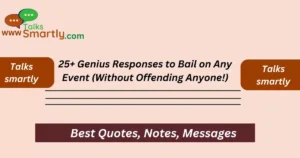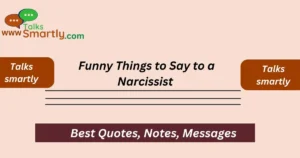“Best Responses to Someone Playing You – Take control, set boundaries, and stay strong.”
Discovering that someone has been playing you, whether it’s in a relationship, friendship, or at work, can leave you feeling hurt, confused, and vulnerable. You might wonder what went wrong or what you could have done differently.
In such moments, having the right response can help you regain control of the situation and ensure you don’t get played again. If you’ve been played and are unsure how to respond, this article offers 35 best responses that will not only make you feel empowered but also help you take charge of your emotional wellbeing.
Whether you want to set boundaries, seek closure, or simply move on, these responses will give you the confidence to face the situation head-on. So, if you’re ready to learn how to respond to someone who’s been playing you, keep reading. We’ll explore various ways to deal with manipulation, deceit, and dishonesty while keeping your self-respect intact.
35 Responses to Someone Playing You
- Call out their behavior clearly
- State your feelings without blame
- Ask for direct communication
- Set clear boundaries
- Detach emotionally from the situation
- Give them an ultimatum
- Refuse to play along with their game
- Ask them to explain their actions
- Walk away gracefully
- Hold them accountable for their actions
- Stay calm and collected
- Express disappointment, not anger
- Highlight the impact of their actions
- Reaffirm your self-worth
- Say nothing and observe
- Tell them you deserve better
- Trust your instincts and intuition
- Ask if this is what they really want
- Make your expectations clear
- Cut off contact if necessary
- Stay true to yourself
- Demand transparency moving forward
- Show them you’re unbothered
- Forgive them, but don’t forget
- Take a break and reflect
- Don’t engage in emotional manipulation
- Redirect the conversation to facts
- Highlight the inconsistency in their behavior
- Take control of the narrative
- Let them feel the consequences
- Don’t chase them for explanations
- Acknowledge the red flags
- Seek closure on your own terms
- Focus on your future, not the past
- Rebuild your confidence
1. Call out their behavior clearly
When someone is playing you, the first step is to confront the behavior head-on. Don’t let them hide behind excuses or vague actions. Be direct in acknowledging that something is wrong.
- Example: “I’ve noticed you’ve been giving me mixed signals lately. Can we talk about what’s really going on?”
2. State your feelings without blame
Use “I” statements to express how you feel without pointing fingers. This makes the conversation less accusatory and more about how their actions impact you.
- Example: “I feel hurt when I’m left in the dark about things that are important to me.”
3. Ask for direct communication
When you’re being played, it’s often due to lack of communication or honesty. Asking for straightforward answers can help clear the air.
- Example: “I need clear communication moving forward, so we both know where we stand.”
4. Set clear boundaries
If you feel taken advantage of, establish firm boundaries to protect your emotional wellbeing. Boundaries help you regain control of your relationship.
- Example: “I’m not okay with being ignored. If this continues, I won’t be able to continue our relationship.”
5. Detach emotionally from the situation
Detaching emotionally helps you remain objective and avoid reacting impulsively. It’s crucial when you feel manipulated or played.
- Example: “I’m going to step back for a bit and think about how I want to move forward from here.”
6. Give them an ultimatum

Sometimes people won’t change until they’re faced with clear consequences. An ultimatum can force them to either change or step out of your life.
- Example: “If I don’t see any effort to be honest, I’m going to have to walk away from this.”
7. Refuse to play along with their game
When you refuse to engage in their mind games, you take away their power. Don’t let them manipulate or deceive you any further.
- Example: “I’m not going to play these games. Either be straightforward, or I’m out.”
8. Ask them to explain their actions
Holding them accountable starts with asking for an explanation. Demand clarity about why they’ve acted the way they did.
- Example: “Can you explain why you’ve been acting so distant recently?”
9. Walk away gracefully
Walking away isn’t a sign of weakness. Leaving with grace shows maturity and self-respect, allowing you to preserve your dignity.
- Example: “I think it’s best for both of us if I step away from this situation.”
10. Hold them accountable for their actions
Let them know that their actions have consequences. It’s important to let them face the reality of how they’ve treated you.
- Example: “What you did hurt me, and I won’t forget that easily.”
11. Stay calm and collected
The best response is often calmness. By keeping your emotions in check, you prevent them from manipulating the situation.
- Example: “I understand what’s happened, but I’m not going to let it control me.”
12. Express disappointment, not anger
Anger can escalate the situation. Instead, show your disappointment in a calm and measured way.
- Example: “I’m really disappointed that you chose to treat me this way.”
13. Highlight the impact of their actions
Help them understand the gravity of what they’ve done by explaining how their actions have affected you emotionally or mentally.
- Example: “Your lack of honesty has really damaged my trust in you.”
14. Reaffirm your self-worth
Remind them, and yourself, that you deserve better. Reaffirming your value can make it clear that you won’t tolerate being played.
- Example: “I know my worth, and I won’t settle for less than respect.”
15. Say nothing and observe
Sometimes silence speaks louder than words. By staying quiet and observing, you can learn more about their intentions.
- Example: “I’m going to take a step back and watch how things play out.”
16. Tell them you deserve better
Make it clear that you’re not going to accept their behavior. You know your value and won’t stand for anything less.
- Example: “I deserve to be treated with honesty and respect.”
17. Trust your instincts and intuition
If something feels off, trust that gut feeling. Listening to your intuition often leads to the best decisions.
- Example: “My instincts are telling me something’s wrong, and I’m going to trust that.”
18. Ask if this is what they really want
Sometimes, people don’t realize the full impact of their actions. Asking them to reflect on their behavior can prompt a change.
- Example: “Is this really how you want things to go between us?”
19. Make your expectations clear
Clarity in what you expect from them moving forward leaves no room for confusion.
- Example: “I expect honesty and respect if we’re going to continue seeing each other.”
20. Cut off contact if necessary
If their actions have crossed a line, cutting off contact may be the only solution to protect yourself.
- Example: “I’m going to have to cut contact for my own peace of mind.”
Best Responses to “Good for You”
21. Stay true to yourself
When someone plays you, don’t let it change who you are. Stick to your values and don’t compromise your integrity.
- Example: “I won’t lower my standards just because you’re not meeting them.”
22. Demand transparency moving forward
Make it clear that openness is essential if the relationship is to continue.
- Example: “I need complete honesty from here on out, or this won’t work for me.”
23. Show them you’re unbothered
Refuse to give them the satisfaction of seeing you upset. Stay cool and calm.
- Example: “If you thought you could break me, think again.”
24. Forgive them, but don’t forget
Forgiveness is for your peace of mind, but don’t allow them to repeat the same mistakes.
- Example: “I can forgive, but I won’t forget what happened.”
25. Take a break and reflect
Give yourself space to think before reacting emotionally. Sometimes a pause brings clarity.
- Example: “I need time to process everything that’s happened.”
26. Don’t engage in emotional manipulation
If they’re trying to play with your emotions, refuse to be drawn into their games.
- Example: “I’m not going to let you manipulate me anymore.”
27. Redirect the conversation to facts
Stick to the truth and avoid getting caught up in emotions or lies.
- Example: “Let’s focus on what’s actually happened, not excuses.”

28. Highlight the inconsistency in their behavior
Pointing out their contradictory actions can make them confront their own behavior.
- Example: “You say one thing but your actions show something completely different.”
29. Take control of the narrative
Refuse to let them dictate the story. Speak your truth and set the record straight.
- Example: “You don’t get to control how this story ends for me.”
30. Let them feel the consequences
If they play you, there should be consequences. Make sure they understand that.
- Example: “Your actions have consequences, and now you’ll face them.”
31. Don’t chase them for explanations
If they don’t want to give you clarity, don’t force it. Their silence speaks volumes.
- Example: “I won’t chase after answers. I’ll move on without them.”
32. Acknowledge the red flags
Recognizing the signs early on can help you avoid being played again.
- Example: “I saw the red flags, and I should have listened to them.”
33. Seek closure on your own terms
Sometimes closure doesn’t come from them. You can find it within yourself.
- Example: “I don’t need an apology to find closure. I can give that to myself.”
34. Focus on your future, not the past
Don’t dwell on being played. Instead, focus on what lies ahead for you.
- Example: “I’m leaving this behind and looking forward to a brighter future.”
35. Rebuild your confidence
Being played can shake your confidence. Rebuild it by reminding yourself of your worth.
- Example: “I’m stronger than this experience, and I won’t let it define me.”
Key Insight
1. What does it mean when someone is playing you?
It means they are manipulating or deceiving you for their benefit, often hiding their true intentions.
2. How do you tell if someone is playing you?
Signs include inconsistent behavior, lack of transparency, mixed signals, or broken promises.
3. Is it okay to walk away from someone who’s playing you?
Yes, walking away shows strength and self-respect, especially if they continue to mistreat you.
4. How do you avoid being played again?
Set clear boundaries, trust your instincts, and communicate openly in future relationships.
5. What should you do if the person apologizes?
Consider their sincerity and whether their actions align with their apology before deciding how to proceed.
Conclusion
Facing the reality that someone has been playing you is tough, but how you respond will define your strength and resilience. These 35 best responses provide a range of ways to handle the situation with grace and empowerment.
Whether you decide to confront them, set boundaries, or walk away, always remember to prioritize your peace and self-respect. The right response not only protects your emotional health but also sets the tone for how others should treat you in the future.











